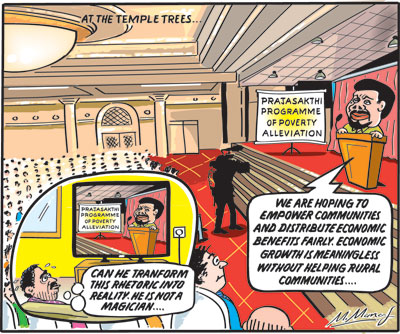Columns
Will Prajasakthi succeed where earlier poverty alleviation programmes failed?
View(s):Inaugurating the Prajasakthi programme on July 4 at Temple Trees, President Anura Kumara Dissanayake said the objective of the initiative was “to empower communities and distribute economic benefits fairly.”
He asserted that “economic growth is meaningless without helping rural communities.” and that “eliminating rural poverty is a government responsibility.”
Furthermore, he emphasised that “welfare must target the right people and not be misused for political gains.” The Prajasakthi programme attempts to transform our values and social behaviour.
No one can disagree with these objectives so eloquently expressed by the President. No one, not even his bitterest opponents, political scientists, economists, or commentators, could disagree with him.

Question
They may, however, ask whether the President’s impressive rhetoric could be realised during his tenure or even in another decade.
Even progress towards its goals would be a significant leap forward.
Reticence
For whatever reason, there has been an absence of comment on this event and the President’s significant speech. One can only conjecture that this is due to a public scepticism of the realisation of the desired objectives of the Prajasakthi programme.
Implementation
Implementation of policies has been a persistent national weakness. As a former Resident Representative of the World Bank said as her farewell advice, Sri Lanka’s first, second and third priorities are implementation, implementation and implementation.
The implementation of the Prajasakthi programme would be most challenging, as it attempts to bring about a social transformation.
Transformation
To achieve the objectives spelt out by the President, what is required is a transformation in society’s values and social behaviour. This is a “mission impossible”. Yet, we must endeavour to achieve it.
Aswesuma
The inauguration of the Prajasakthi programme on the heels of the Aswesuma poverty relief programme is a tacit admission of Aswasuma’s inadequacies in reaching the poor.
In fact, all poverty alleviation programmes of successive governments, be it Janasaviya, Samurdhi or the current Aswesuma, have suffered from poor targeting.
Weakness
Their serious flaw has been unintended and undeserving beneficiaries receiving benefits, while deserving families have not. Besides, administrative costs of the programmes were high.
Changing pillows
In this context, one is reminded of the Sinhala saying that the introduction of another poverty alleviation programme was like changing pillows to cure a cold!
Walk the talk
One is also reminded of the Sinhala saying ‘Kathawanam dolawen yanna wenne kakul theken.’ (Talking is like being taken on a palanquin, but going is by foot.) Can the government walk the talk? This is the key question.
Significant
In its short tenure, the government has brought to book large corrupt deals, as well as curtailed unnecessary and wasteful state expenditure. This is a significant step in good governance and will contribute towards the growth of the economy. However, the objective of the Prajasakthi is transforming society—a formidable challenge.
Implementation
There is a growing perception that the government lacks the skills and experience for implementing needed changes and reforms. This perception must be changed by results. The effective implementation of policies is as important as or more important than announcing correct policies.
Discontent
On the other hand, the people are disappointed that their expectation of an improvement in their livelihoods has not materialised. Improving livelihoods will, however, be difficult in the current global economic conditions when indications are that the economy will face severe external shocks.
Concluding reflection
There is hope as well as scepticism over the JVP/NPP government’s ability to achieve a political, social, and economic transformation.
The government’s commitment to the formidable challenge of eradicating corruption is in itself an enormous challenge: a massive socio-economic transformation that could bring about economic development.
There is also scepticism that the JVP/NPP government would achieve a political, social and economic transformation.
The government’s commitment to the Herculean task of eradicating corruption is a massive socio-economic transformation that could bring about economic development. It is not clear whether the large number of convictions would enrich the public coffers and deter corruption. As significant is the fact that it would reduce government expenditure. More significantly, there is ample evidence that those in important positions are persons of knowledge, experience, and, most of all, persons with integrity and committed to good governance. Therein lies the nation’s hopes for an economic and social transformation of the country.
The government’s commitment to the formidable challenge of eradicating corruption is in itself an enormous challenge; it is a massive socio-economic transformation that could bring about economic development.
Buying or selling electronics has never been easier with the help of Hitad.lk! We, at Hitad.lk, hear your needs and endeavour to provide you with the perfect listings of electronics; because we have listings for nearly anything! Search for your favourite electronic items for sale on Hitad.lk today!


Leave a Reply
Post Comment